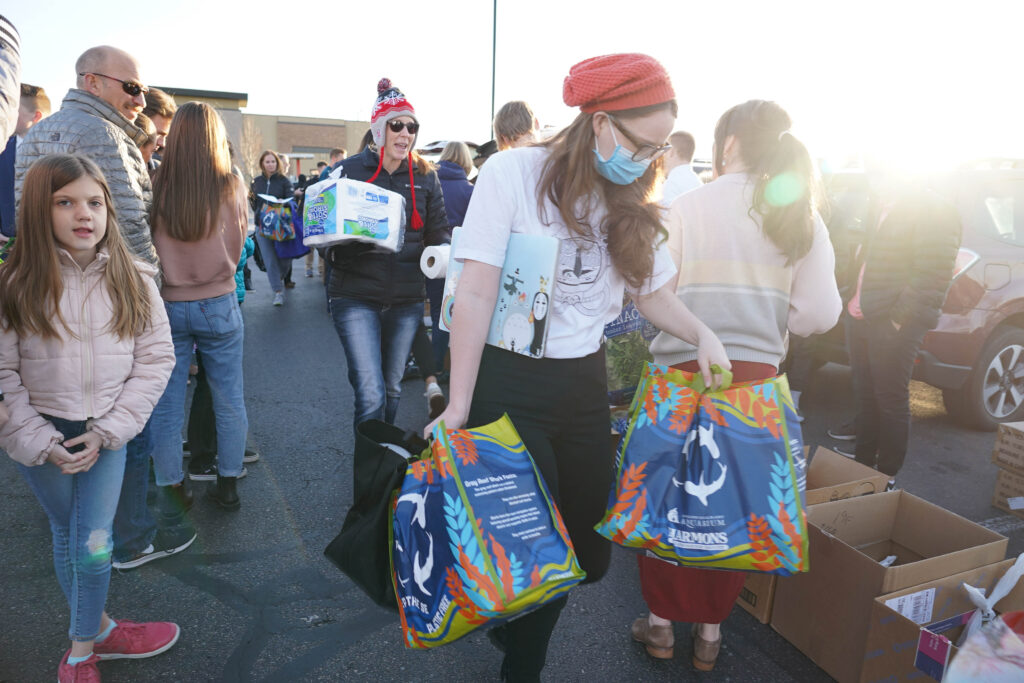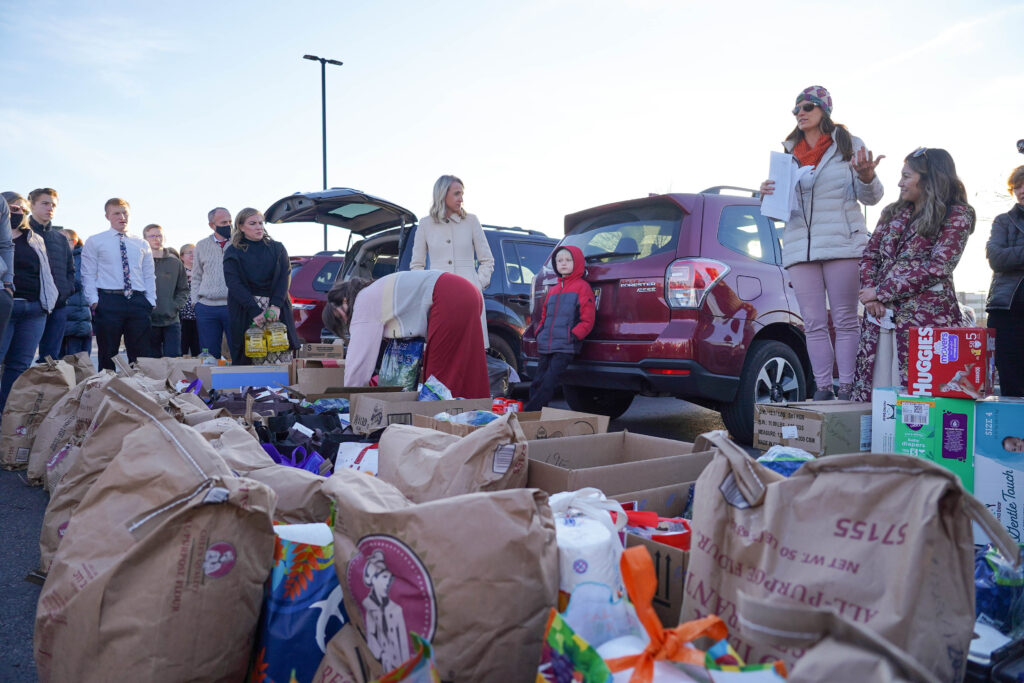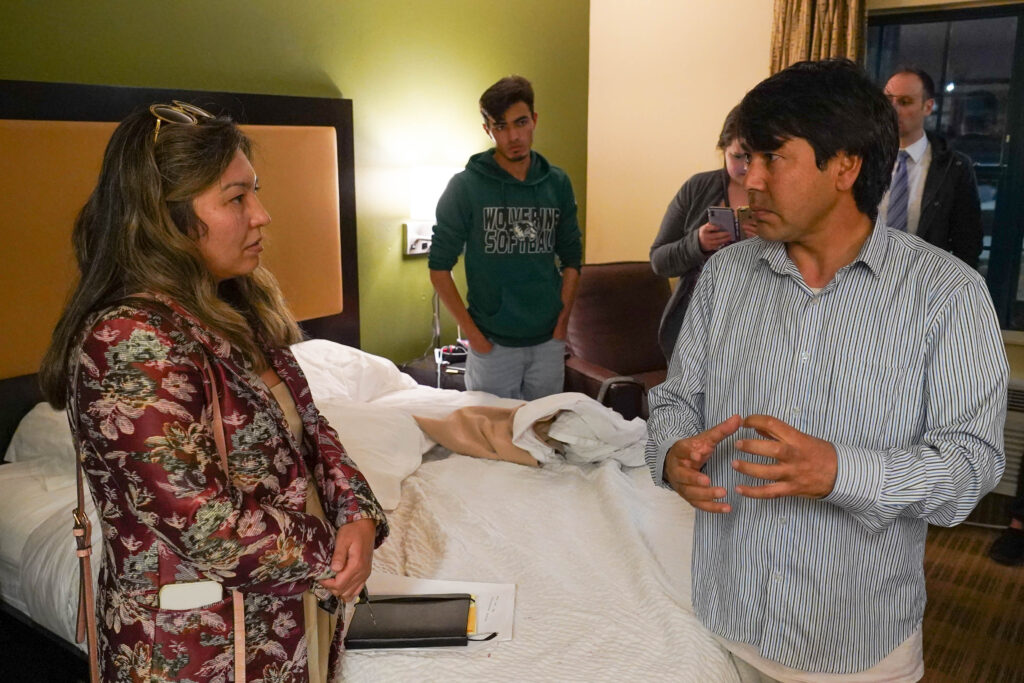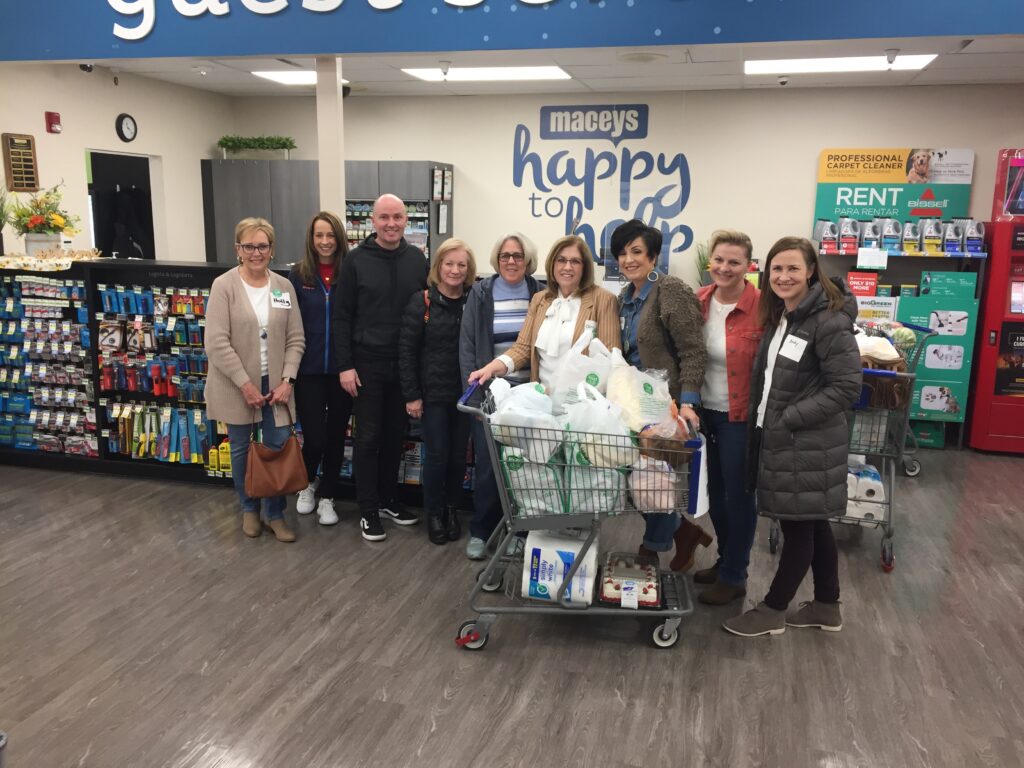
On a quiet Sunday afternoon, a flurry of activity erupted outside of a strip mall in a suburb of Salt Lake City. As dozens of cars pulled in and families dressed in their Sunday best piled out, even one of the organizers was alarmed at just how many people showed up.
“Oh my gosh,” she exclaimed, “This is a bigger crowd than I thought!”
Nazifa is a refugee from Afghanistan who arrived in the US in 2002. She doesn’t want to use her last name because she is still worried about the safety of the family members who remain in her home country. When she and others organized this event in December of 2021, she hoped volunteers would show up to help families relocated to Utah after the U.S. military withdrew from Afghanistan four months earlier. But a language barrier was making the logistics of this plan a bit more complicated than she expected. On one hand, she had about 75 Utahns anxious to help their newest neighbors. On the other hand, she had only three translators to help them communicate with families who spoke little or no English.
“Do we have more translators?”, she asked the young man standing next to her, as the crowd of volunteers assembled on the asphalt.
“Just us three,” he replied.
By early December of 2021, about 450 Afghans had arrived in Utah. That number would double in just a couple of months. Nazifa was trying to help as many of them as she could, particularly those from her Hazara community, a persecuted minority in Afghanistan. Through her efforts, she had met a woman named Jennifer Hua, who’d offered to roll up her sleeves and assist where she could.
“She needed a ton of help. So I’m like, ‘OK, I found my spot’,” Hua said.
The two women started organizing volunteers to meet the new Afghan arrivals, many of whom were staying temporarily in hotels. Normally, refugees would be placed directly in long-term homes or apartments by resettlement agencies, but because so many Afghans were arriving on short notice during an affordable housing shortage, the agencies had to find alternatives.
While the agencies were maxed out just trying to meet basic needs like housing and healthcare, ordinary people like Hua and Nazifa – took it upon themselves to fill in the gaps they saw in the lives of these new Utahns.
“A few of us went out and saw a family – they only had rice and oil,” Hua said, “When I saw that, I just couldn’t sleep that night. We were meeting so many Afghan families that just needed a lot of help.” She quickly realized they were limited in what they could do on their own. “We’re at capacity,” Hua said. “I needed to blast the word out to get more help.”
That’s when Hua got the idea for what she called a “flash service project.” She reached out to her network in the Church of Jesus Christ of Latter-day Saints to find volunteers, and the response was overwhelming.
“I just sent the word out to come and help… and we got a lot of people.”

In the parking lot, Hua opened the trunk of her car, and pulled out large bags of flour, boxes of diapers, and whole chickens, while volunteers started distributing them into a couple dozen boxes lined up on the pavement.
“We are just taking boxes of food to several families in the area and also some hygiene and some cleaning kits for them just to get started,” Hua explained. The idea was that volunteers would deliver the supplies to about 25 Afghan families living in various parts of the Salt Lake valley. Nazifa had identified which families needed help through her connections in the community.
But as the volunteers loaded the boxes in their cars, and headed off to meet the Afghan families, Nazifa worried about whether they’d be able to communicate because there weren’t nearly enough translators. The service project was meant to deliver more than a box of food. She hoped these volunteers would start relationships with the new arrivals to help them through the challenges they faced in the months to come.
Would this army of volunteers that appeared in a flash disappear just as quickly after their deliveries? Or was it possible that a box of groceries could be the beginning of a more meaningful relationship?
The new KSL podcast “Stranger Becomes Neighbor” explores the efforts of people like Nazifa and Jennifer Hua as they try to find ways to aid the Afghan arrivals in our communities. But they would discover that it wasn’t so easy to bridge the gap between what people wanted to give and what people needed.
The Biggest Need
Inside one of the hotel rooms, a middle-aged Afghan man dressed in a button-up shirt and sweatpants, sat on the end of a queen bed telling his story to several volunteers huddled up against the wall, while Nazifa translated for them. He explained that he was a deputy governor for three provinces, had helped to oversee elections, and had worked closely with Americans. That made him and his family targets. He was here with his 21-year-old son, but his wife and his four younger children were still in Afghanistan. He said his uncle was already killed by the Taliban. He was afraid for his family’s safety, and he worried how they would survive.
He thanked everyone for the visit and for the box of food, but added that it wasn’t food he needed.
“He’s worried about his wife and kids in Afghanistan,” Nazifa translated. “He’s asking me if you know anybody that can help him in the process, how he can bring his kids and wife here, that’s his concern.”

In the hotel lobby, a married couple who came to volunteer were moved by his plea.
“I thought we were just going to drop a food box off,” Emily Loria said. “The horror of that story just kind of resonates. My heart goes out to them.”
“It’s frustrating how helpless you feel,” Jeff Loria said. “Like the one gentleman said many times, he’s fine. It’s his family he’s worried about, so groceries to him isn’t really going to solve his biggest need.”
“They also need friends”
The biggest and most pressing concerns of many of the arrivals would prove difficult for even a motivated local community to address. Many of our newest neighbors had been separated from members of their families. On top of that, most of them arrived with a temporary status called humanitarian parole. So before they could even apply for a visa for family members, they needed to obtain more permanent status for themselves. But getting asylum in the US can take years.
This same issue rose to the surface at a high profile event involving some powerful people in the state. In February 2022, with the help of Nazifa and Jennifer Hua, Utah’s first lady Abby Cox organized a shopping trip at a local grocery store for 15 Afghan families. Governor Spencer Cox was also there, and the first family invited the media to cover the event, in hopes that it would inspire people to help their neighbors.

“We think that Utah is the most generous, most loving and kind state in the nation, and we’re showing that to our refugee families here,” the First Lady said to a ring of TV cameras in the produce aisle. “We want Utah to be a place where everyone feels like they belong, including, and especially our new refugees that are coming from a very, very difficult situation.”
The spouses of Utah’s legislators were invited to accompany the Afghan arrivals to help them navigate an unfamiliar American grocery store. Once again, Nazifa was stressed because very few translators were on hand to help. She ended up running from aisle to aisle, helping everyone communicate their stories to the dignitaries while they filled their grocery carts.
But what started as a kind gesture and a photo op, turned emotional in the canned foods aisle. Standing amongst the kidney beans and macaroni, an Afghan woman loading her shopping cart started sobbing.
“She’s crying because she’s able to get food here, and her kids are hungry,” Nazifa translated. She explained that the woman had three children left behind in Afghanistan, and her 13-year-old daughter had been forced into marriage.
“I’m so sorry. That breaks my heart,” Governor Cox said. “We’re glad you’re here with us. We hope you feel safe here.” The First Lady reached out and hugged her, while the wife of a state senator wiped away tears. Then Cox added, “We’ll pray for your little ones.”
The tragic details they shared during that shopping trip turned a feel-good media moment into something else, something more real. This woman had the chance to share her pain with the most powerful man in the state, and yet, even he couldn’t do anything more than offer her comfort and prayers.
But even as solutions eluded the state’s most powerful, people like Jennifer Hua aren’t waiting for answers. For Hua, being there for our newest neighbors is not just about bringing food in an emergency. It’s about connection. When one of her friends was bringing winter clothes to a newly arrived Afghan family, she learned that the mother had lost one of her small children in the crowd at the Kabul airport.
“She’s here without her four year old, and she just sobbed, and my friend sobbed, and I sobbed when she told me about it,” Hua said. “That connection that they made, that woman needed that! They don’t just need clothes. That’s kind of easy, actually. They don’t just need food. That also is easy, once it’s organized. They also need friends and someone to say ‘Oh my goodness’, and put their arms around you and let you cry. And then help you navigate the kind of scary situation of needing to find a job and needing to get an education in a foreign country.”
Just two days after the grocery store event with Utah’s First Family, another global crisis dominated the headlines. Russia invaded Ukraine and another flood of people would be displaced from their home country.
“There was all this media hype when evacuation happened,” Nazifa said. “Everybody was like, ‘Oh, my gosh, what happened in Afghanistan?’ And a few months later, nobody cared about Afghanistan.”
But while public attention for Afghanistan and the more than 80,000 Afghans living in US communities dissipated, Hua was undeterred.
“It’s easy to see all of the bad news and become numb,” Hua said, but rather than getting discouraged, she’s energized when she spends time with her newest friends from Afghanistan. “When you have personal relationships with people who are in such a dramatic plight, you just feel this urgency to do something. Ukraine, of course, is very much a similar situation. It’s so dramatically difficult. I say let’s take a look at our system and get it in fine working order, because if we all work together, we could really make a big difference.”
As “Stranger Becomes Neighbor” continues, people like Hua will attempt some creative solutions and others will pursue political action to address the deepest concerns of their new friends and neighbors.
Season 1: “Afghan Arrivals” is available at StrangerBecomesNeighbor.com or wherever you listen to podcasts. New episodes are published every Tuesday.